Test Bank for Economics Today, 17/E 17th Edition Roger LeRoy Miller
$38.00
ISBN-10: 013314867X
ISBN-13: 9780133148671
Economics Today—Bringing the Real World to Your Students
Students learn best when they see concepts applied to examples from their everyday lives. This new edition of Economics Today covers leading-edge issues while lowering barriers to student learning. The text relentlessly pursues the fundamental objective of showing students how economics is front and center in their own lives while providing them with many ways to evaluate their understanding of key concepts covered in each chapter.
- Description
- Reviews (0)
Description
You will receive this product immediate after placing the order
Economics Today, 17e (Miller)
Chapter 1 The Nature of Economics
1.1 The Power of Economic Analysis
1) The economic way of thinking will help you
A) make decisions in financing your home.
B) decide whether the U.S. government should encourage or discourage immigration.
C) make better decisions concerning your education.
D) all of the above
Answer: D
Diff: 1
Topic: 1.1 The Power of Economic Analysis
Learning Outcome: Micro-1: Identify the basic principles of economics and explain how to think like an economist
AACSB: Analytic skills
Question Status: Previous Edition
2) Economic analysis is used
A) only in economics classrooms.
B) only by business people.
C) only by policy makers.
D) in all decision making.
Answer: D
Diff: 1
Topic: 1.1 The Power of Economic Analysis
Learning Outcome: Micro-1: Identify the basic principles of economics and explain how to think like an economist
AACSB: Analytic skills
Question Status: Previous Edition
3) Economic analysis is a tool that
A) aids all decision making.
B) helps us understand why people make mistakes.
C) helps us forgive selfish people.
D) complicates decision making.
Answer: A
Diff: 1
Topic: 1.1 The Power of Economic Analysis
Learning Outcome: Micro-1: Identify the basic principles of economics and explain how to think like an economist
AACSB: Analytic skills
Question Status: Revised
4) What is the purpose of knowing “the economic way of thinking”?
Answer: The economic way of thinking provides a framework for analyzing solutions to economic problems. Since economic problems confront all of us much of the time, knowledge of economics will enable one to arrive at better decisions, and enable one to evaluate many public policy questions in a systematic manner.
Diff: 1
Topic: 1.1 The Power of Economic Analysis
Learning Outcome: Micro-1: Identify the basic principles of economics and explain how to think like an economist
AACSB: Analytic skills
Question Status: Previous Edition
5) What does scarcity have to do with the fact that people must make choices?
Answer: Scarcity implies that people cannot have everything they want. This implies that ways must be found to determine which of the many goods that people want will actually be produced. Further, since any person cannot have everything he or she wants, the person must decide which specific things to acquire. That is, the person must make choices.
Diff: 2
Topic: 1.1 The Power of Economic Analysis
Learning Outcome: Micro-1: Identify the basic principles of economics and explain how to think like an economist
AACSB: Analytic skills
Question Status: Previous Edition
6) What is economics and what does it try to explain?
Answer: Economics is the study of how people allocate their limited resources in an attempt to satisfy their unlimited wants. Therefore, it is the study of how people make choices. Economics tries to explain real-world behavior, especially as it relates to interactions of people confronting scarcity.
Diff: 1
Topic: 1.1 The Power of Economic Analysis
Learning Outcome: Micro-1: Identify the basic principles of economics and explain how to think like an economist
AACSB: Analytic skills
Question Status: Previous Edition
1.2 Defining Economics
1) Economics is best defined as the
A) study of how people make choices to satisfy their wants.
B) study of individual self-interests.
C) study of how government can most efficiently raise funds by taxation.
D) process by which goods are sold in free markets.
Answer: A
Diff: 1
Topic: 1.2 Defining Economics
Learning Outcome: Micro-1: Identify the basic principles of economics and explain how to think like an economist
AACSB: Analytic skills
Question Status: Previous Edition
2) Economics can be described as the study of how people use ________ resources to satisfy ________ wants.
A) unlimited; unlimited
B) unlimited; limited
C) limited; unlimited
D) limited; limited
Answer: C
Diff: 1
Topic: 1.2 Defining Economics
Learning Outcome: Micro-1: Identify the basic principles of economics and explain how to think like an economist
AACSB: Analytic skills
Question Status: Previous Edition
3) Which statement most accurately defines economics?
A) Economics is the study of how people make money.
B) Economics is the study of how people make choices to satisfy their wants.
C) Economics is the study of values a society should choose.
D) Economics is the study of how to eliminate scarcity.
Answer: B
Diff: 1
Topic: 1.2 Defining Economics
Learning Outcome: Micro-1: Identify the basic principles of economics and explain how to think like an economist
AACSB: Analytic skills
Question Status: Previous Edition
4) In economic analysis, people’s resources are
A) limited and their wants are unlimited.
B) unlimited and their wants are also unlimited.
C) limited and their wants are also limited.
D) unlimited and their wants are limited.
Answer: A
Diff: 1
Topic: 1.2 Defining Economics
Learning Outcome: Micro-1: Identify the basic principles of economics and explain how to think like an economist
AACSB: Analytic skills
Question Status: Previous Edition
5) In economics, items that are used to produce goods and services are known as
A) wants.
B) aggregates.
C) factors of need.
D) resources.
Answer: D
Diff: 1
Topic: 1.2 Defining Economics
Learning Outcome: Micro-1: Identify the basic principles of economics and explain how to think like an economist
AACSB: Analytic skills
Question Status: Previous Edition
6) In economics, all the items that people would consume if they had unlimited income are known as
A) wants.
B) aggregates.
C) outputs.
D) needs.
Answer: A
Diff: 1
Topic: 1.2 Defining Economics
Learning Outcome: Micro-1: Identify the basic principles of economics and explain how to think like an economist
AACSB: Analytic skills
Question Status: Previous Edition
7) In economics, ________ are limited but ________ are unlimited.
A) wants; resources
B) resources; wants
C) money; ideas
D) ideas; money
Answer: B
Diff: 1
Topic: 1.2 Defining Economics
Learning Outcome: Micro-1: Identify the basic principles of economics and explain how to think like an economist
AACSB: Analytic skills
Question Status: Previous Edition
8) Economics is the study of how
A) people make money.
B) preferences are determined.
C) psychology influences preferences.
D) people make choices.
Answer: D
Diff: 1
Topic: 1.2 Defining Economics
Learning Outcome: Micro-1: Identify the basic principles of economics and explain how to think like an economist
AACSB: Analytic skills
Question Status: Previous Edition
9) A fundamental aspect of economics is to
A) ensure that every firm makes a profit.
B) analyze how choices are made.
C) satisfy all our wants.
D) make sure that our resources will always be unlimited.
Answer: B
Diff: 1
Topic: 1.2 Defining Economics
Learning Outcome: Micro-1: Identify the basic principles of economics and explain how to think like an economist
AACSB: Analytic skills
Question Status: Previous Edition
10) Economics is the study of
A) how to get rich.
B) how people allocate their limited resources to satisfy their unlimited wants.
C) how people spend their income.
D) why people want certain goods and services rather than other goods and services.
Answer: B
Diff: 1
Topic: 1.2 Defining Economics
Learning Outcome: Micro-1: Identify the basic principles of economics and explain how to think like an economist
AACSB: Analytic skills
Question Status: Previous Edition
11) Economics is the study of
A) nonhuman phenomena.
B) the determinants of preferences.
C) scarce resources and unlimited wants.
D) the physical sciences.
Answer: C
Diff: 1
Topic: 1.2 Defining Economics
Learning Outcome: Micro-1: Identify the basic principles of economics and explain how to think like an economist
AACSB: Analytic skills
Question Status: Previous Edition
12) Economics deals with
A) how to profit from the stock market.
B) how to satisfy limited human wants.
C) how society allocates unlimited resources.
D) how individuals allocate scarce resources to satisfy unlimited human wants.
Answer: D
Diff: 1
Topic: 1.2 Defining Economics
Learning Outcome: Micro-1: Identify the basic principles of economics and explain how to think like an economist
AACSB: Analytic skills
Question Status: Previous Edition
13) Economics is the study of
A) how to own as many resources as possible.
B) ceteris paribus.
C) the way people think rather than the way they act.
D) how people allocate their limited resources to satisfy their unlimited wants.
Answer: D
Diff: 1
Topic: 1.2 Defining Economics
Learning Outcome: Micro-1: Identify the basic principles of economics and explain how to think like an economist
AACSB: Analytic skills
Question Status: Previous Edition
14) Economic resources are
A) all the items that people would purchase if they had limited wants.
B) all the unlimited items that people would purchase with limited income.
C) items of value that are used to make other things that satisfy people’s wants.
D) the total planned expenditures throughout the nation.
Answer: C
Diff: 1
Topic: 1.2 Defining Economics
Learning Outcome: Micro-1: Identify the basic principles of economics and explain how to think like an economist
AACSB: Analytic skills
Question Status: Previous Edition
15) Economics is concerned with choices
A) that involve the wants of individuals.
B) that involve the political goals of professional associations.
C) made by individuals only when they are consuming goods or services.
D) that involve making money.
Answer: A
Diff: 1
Topic: 1.2 Defining Economics
Learning Outcome: Micro-1: Identify the basic principles of economics and explain how to think like an economist
AACSB: Analytic skills
Question Status: Previous Edition
16) Economics is a social science that involves the study of how individuals
A) develop their tastes and preferences.
B) maximize their wealth.
C) define happiness.
D) choose among alternatives to satisfy their unlimited wants.
Answer: D
Diff: 1
Topic: 1.2 Defining Economics
Learning Outcome: Micro-1: Identify the basic principles of economics and explain how to think like an economist
AACSB: Analytic skills
Question Status: Previous Edition
17) Economics is a part of the
A) social sciences.
B) natural sciences.
C) biological sciences.
D) organizational sciences.
Answer: A
Diff: 1
Topic: 1.2 Defining Economics
Learning Outcome: Micro-1: Identify the basic principles of economics and explain how to think like an economist
Question Status: Previous Edition
18) Wants are
A) another term for needs.
B) the things people would consume if they had unlimited incomes.
C) the things people consume with their income.
D) all the things people really need in order to live comfortably.
Answer: B
Diff: 1
Topic: 1.2 Defining Economics
Learning Outcome: Micro-1: Identify the basic principles of economics and explain how to think like an economist
AACSB: Analytic skills
Question Status: Previous Edition
19) The primary purpose of economics is to understand how people make
A) money.
B) goods and services.
C) choices.
D) a comfortable living.
Answer: C
Diff: 1
Topic: 1.2 Defining Economics
Learning Outcome: Micro-1: Identify the basic principles of economics and explain how to think like an economist
AACSB: Analytic skills
Question Status: Previous Edition
20) The primary objective of economics is
A) to learn how to create more resources.
B) to study how people make choices with limited resources.
C) to learn how to make the most profits with a given amount of resources.
D) to study why some people are never happy with the resources they have.
Answer: B
Diff: 1
Topic: 1.2 Defining Economics
Learning Outcome: Micro-1: Identify the basic principles of economics and explain how to think like an economist
AACSB: Analytic skills
Question Status: Previous Edition
21) The basic economic problem is a situation of
A) limited resources and unlimited wants.
B) both limited resources and limited wants.
C) limited incomes and unlimited choices.
D) unlimited incomes and limited choices.
Answer: A
Diff: 1
Topic: 1.2 Defining Economics
Learning Outcome: Micro-1: Identify the basic principles of economics and explain how to think like an economist
AACSB: Analytic skills
Question Status: Previous Edition
22) Economics is the study of how people make
A) judgments.
B) investments.
C) money.
D) choices.
Answer: D
Diff: 1
Topic: 1.2 Defining Economics
Learning Outcome: Micro-1: Identify the basic principles of economics and explain how to think like an economist
AACSB: Analytic skills
Question Status: Previous Edition
23) Economics is a
A) hard science.
B) physical science.
C) natural science.
D) social science.
Answer: D
Diff: 1
Topic: 1.2 Defining Economics
Learning Outcome: Micro-1: Identify the basic principles of economics and explain how to think like an economist
Question Status: Previous Edition
24) Economics is a study of
A) how to make money in the stock market.
B) how to run a business successfully.
C) the allocation of scarce resources.
D) personal finance.
Answer: C
Diff: 1
Topic: 1.2 Defining Economics
Learning Outcome: Micro-1: Identify the basic principles of economics and explain how to think like an economist
AACSB: Analytic skills
Question Status: Previous Edition
25) Economics is the study of
A) the allocation of scarce resources to satisfy unlimited wants.
B) why some people want certain goods and services.
C) earning the most income.
D) ways to use fewer resources.
Answer: A
Diff: 1
Topic: 1.2 Defining Economics
Learning Outcome: Micro-1: Identify the basic principles of economics and explain how to think like an economist
AACSB: Analytic skills
Question Status: Previous Edition
26) Resources are
A) unlimited.
B) able to be replicated in large quantities.
C) what people would buy if their income was unlimited.
D) used to produce goods and services to satisfy people’s wants.
Answer: D
Diff: 1
Topic: 1.2 Defining Economics
Learning Outcome: Micro-1: Identify the basic principles of economics and explain how to think like an economist
AACSB: Analytic skills
Question Status: Previous Edition
27) ________ are the things that are used to produce items that satisfy people’s wants.
A) Concepts
B) Production possibilities curves
C) Resources
D) Costs
Answer: C
Diff: 2
Topic: 1.2 Defining Economics
Learning Outcome: Micro-1: Identify the basic principles of economics and explain how to think like an economist
AACSB: Analytic skills
Question Status: Previous Edition
28) Economics is most precisely defined as
A) a study of what people need to survive.
B) a study of how culture evolves in different geographic areas.
C) the same as the study of finance and management.
D) the study of how people make choices.
Answer: D
Diff: 1
Topic: 1.2 Defining Economics
Learning Outcome: Micro-1: Identify the basic principles of economics and explain how to think like an economist
AACSB: Analytic skills
Question Status: Revised
29) Economics
A) is a social science.
B) is concerned with limited resources.
C) is concerned with unlimited wants.
D) All of the above are correct.
Answer: D
Diff: 1
Topic: 1.2 Defining Economics
Learning Outcome: Micro-1: Identify the basic principles of economics and explain how to think like an economist
AACSB: Analytic skills
Question Status: Previous Edition
30) Which of the following is NOT a focus of the study of economics?
A) how individual preferences are formed
B) unemployment
C) inflation
D) prices in particular markets
Answer: A
Diff: 1
Topic: 1.2 Defining Economics
Learning Outcome: Micro-1: Identify the basic principles of economics and explain how to think like an economist
AACSB: Analytic skills
Question Status: Previous Edition
31) Because resources are scarce relative to wants, the study of economics concerns
A) how money is important to people.
B) how individuals, businesses, and governments make choices.
C) how money is used to buy what people want.
D) None of the above are correct.
Answer: B
Diff: 2
Topic: 1.2 Defining Economics
Learning Outcome: Micro-1: Identify the basic principles of economics and explain how to think like an economist
AACSB: Analytic skills
Question Status: Previous Edition
32) In the definition of economics,
A) both resources and wants are limited.
B) both resources and wants are unlimited.
C) resources are limited and wants are unlimited.
D) resources are unlimited and wants are limited.
Answer: C
Diff: 1
Topic: 1.2 Defining Economics
Learning Outcome: Micro-1: Identify the basic principles of economics and explain how to think like an economist
AACSB: Analytic skills
Question Status: Previous Edition
33) Microeconomics is defined as that part of economic analysis that
A) studies the behavior of the economy as a whole.
B) includes the problems of inflation and unemployment.
C) studies individual decision making by households and firms.
D) concerns aggregate production and consumption.
Answer: C
Diff: 1
Topic: 1.2 Defining Economics
Learning Outcome: Micro-1: Identify the basic principles of economics and explain how to think like an economist
AACSB: Analytic skills
Question Status: Previous Edition
Be the first to review “Test Bank for Economics Today, 17/E 17th Edition Roger LeRoy Miller”
You must be logged in to post a review.

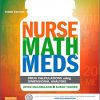
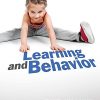
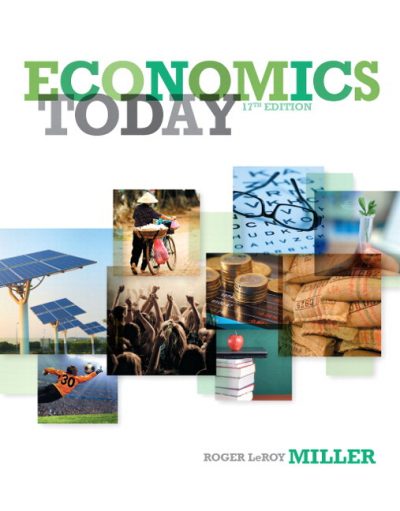
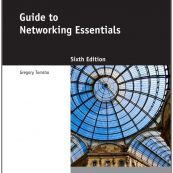
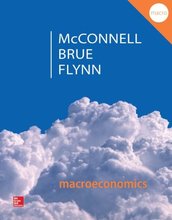
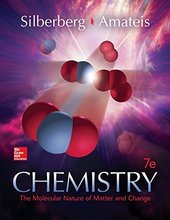
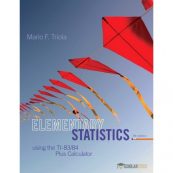
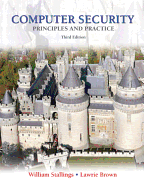
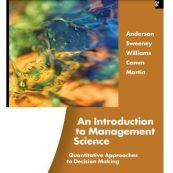
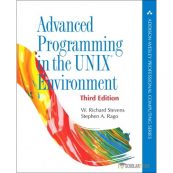
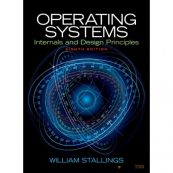
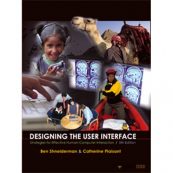
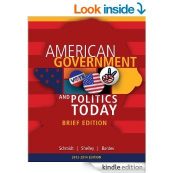
Reviews
There are no reviews yet.